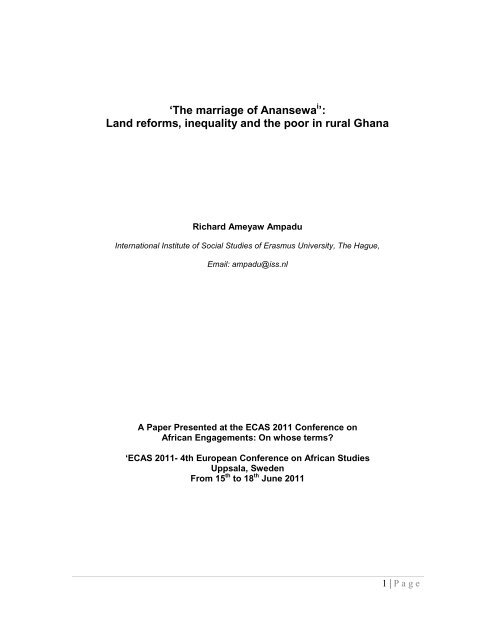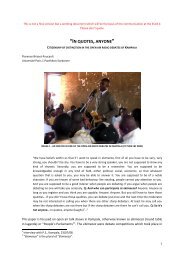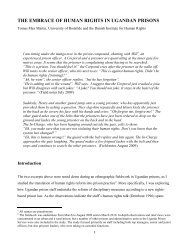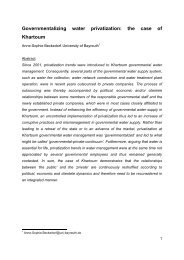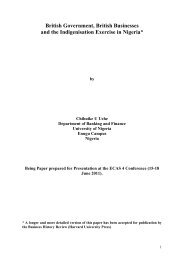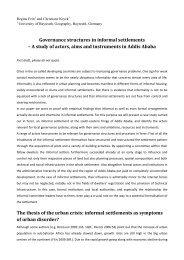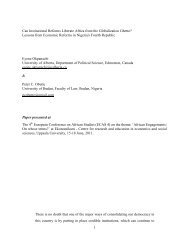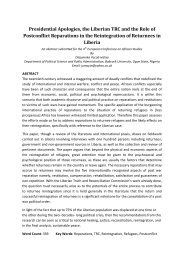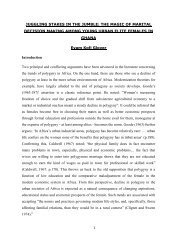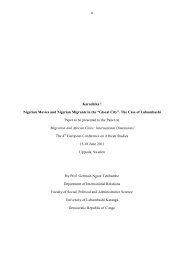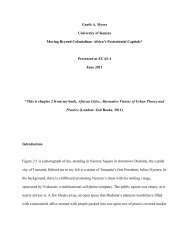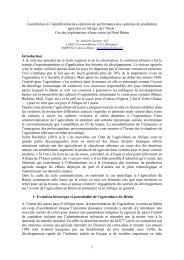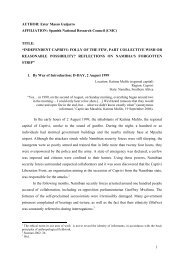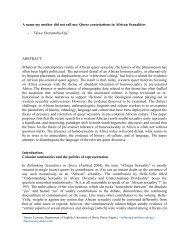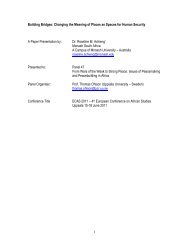Richard Ampadu - Full paper - The Nordic Africa Institute
Richard Ampadu - Full paper - The Nordic Africa Institute
Richard Ampadu - Full paper - The Nordic Africa Institute
Create successful ePaper yourself
Turn your PDF publications into a flip-book with our unique Google optimized e-Paper software.
‘<strong>The</strong> marriage of Anansewa i ’:<br />
Land reforms, inequality and the poor in rural Ghana<br />
<strong>Richard</strong> Ameyaw <strong>Ampadu</strong><br />
International <strong>Institute</strong> of Social Studies of Erasmus University, <strong>The</strong> Hague,<br />
Email: ampadu@iss.nl<br />
A Paper Presented at the ECAS 2011 Conference on<br />
<strong>Africa</strong>n Engagements: On whose terms?<br />
‘ECAS 2011- 4th European Conference on <strong>Africa</strong>n Studies<br />
Uppsala, Sweden<br />
From 15 th to 18 th June 2011<br />
1 | P a g e
Abstract<br />
‘<strong>The</strong> marriage of Anansewa:<br />
Land reforms, inequality and the poor in rural Ghana<br />
Name: <strong>Richard</strong> A. <strong>Ampadu</strong> 1 Email: ampadu@iss.nl<br />
International <strong>Institute</strong> of Social Studies of Erasmus University, <strong>The</strong> Hague,<br />
Land reform has been promoted as a key policy to ensure security of land<br />
access and tenure, reduce poverty and promote rural development in developing<br />
countries. While the process is known to present opportunities and constraints to<br />
diverse people, the question of why certain groups are often unable to take<br />
advantage of opportunities presented to improve their wellbeing has not been<br />
adequately addressed. Empirical research on benefits of such reforms in some<br />
developing countries including Ghana, are inconclusive (Basset, 1993; Bruce,<br />
1986; Peters, 2004). This raises questions about the prospects of the new land<br />
reform in Ghana and the fate of poor and derived right holders. This <strong>paper</strong> shows<br />
that land reforms may not inevitably ensure tenure security and benefits accrued<br />
to the poor as assumed by evolutionary theories (Platteau, 1996). It shows that,<br />
the dominant academic notion of land reforms underestimates the complex,<br />
uncertain, multiple and overlapping rights under the customary land tenure<br />
systems (Berry, 1993). State involvement in land reform, as inevitable panacea<br />
for <strong>Africa</strong>’s instability in the land sector (World Bank, 2008) could be misleading<br />
as the state and more powerful people in societies may collude to stifle public<br />
policies aimed at creating equality.<br />
Using data from my recent field work in Ghana, I attempt to explain why<br />
land reforms in Ghana benefit the wealthy and not smallholder poor farmers<br />
whom such reforms theoretically target. I analyze the outcomes for local poor<br />
actors and consider whether the new reform will help to reduce social instability<br />
(inequality, insecurity and conflicts) ubiquitous in the country. <strong>The</strong> study makes<br />
visible the undemocratic nature and elite capture tendencies of land reform<br />
processes in Ghana. It demonstrates that in an unequal society such as in<br />
Ghana, reforms aimed at bringing relief to the poor may tend to exclude them<br />
and rather benefit the wealthy; because of the non-involvement of the poor in<br />
decisions that concerns them and the opportunistic behavior of the more<br />
powerful in society. In view of this it is suggested that the undemocratic nature of<br />
land reforms, exclusion of smallholder poor and vulnerable farmers, not only<br />
constrains agriculture productivity and production but also contributes to growing<br />
unemployment and poverty.<br />
Key words: land reform, inequality, smallholder, elite opportunistic behavior<br />
2 | P a g e
‘…overcoming poverty is not a gesture of charity, but an act of justice…’<br />
(Nelson Mandela of South <strong>Africa</strong>)<br />
Introduction<br />
At the heart of the many challenges of <strong>Africa</strong>’s economic development,<br />
particularly agro based economies such as Ghana, is the debate about the land<br />
question. Land has been identified as key to reducing poverty in the region<br />
(Dieninger, 2003). In most parts of <strong>Africa</strong>, access to land is through ambiguous,<br />
insecure and uncertain customary ii land tenure systems (Berry, 1993). Such<br />
characteristics and the use of customary laws iii to access land, according to<br />
some proponents of property rights create inequality, skew land access and<br />
distribution and encourage inefficient use of land, thereby decreasing productivity<br />
and increasing poverty.<br />
While property rights advocates highlight the enormous gains to be<br />
generated from land privatization through formalization of informal customary<br />
land tenure systems, some empirical reports from the field paradoxically show<br />
the reverse in many developing countries (Peters, 2004). This <strong>paper</strong> adds to this<br />
critique and contributes to the understanding of how a public policy aimed at<br />
reducing social instability, benefits the rich to the detriment of the poor.<br />
Like other countries in sub Saharan <strong>Africa</strong>, Ghana since the 19 th century<br />
has often sought to restructure its land relations, minimize inequality and ensure<br />
poverty reduction through the implementation of various land reforms. <strong>The</strong> main<br />
aim of reforming customary land tenure systems in Ghana has been to enhance<br />
individual security of land rights and improve access of the poor, vulnerable and<br />
disadvantaged groups and individuals in society to land. While these objectives<br />
have largely remained the same over the years, the design and implementation<br />
processes have varied. In Ghana, arguably, land reform processes have<br />
frequently resulted in polarization among land users, creating new classes of<br />
winners and losers. <strong>The</strong> more powerful local elites, chiefs, wealthy and politicians<br />
and others who usually hold and accumulate land for purposes of high rents and<br />
speculation constitute the winners, while the less powerful, smallholder derived<br />
right holders, women, migrants, youth and the poor who depend on land for<br />
survival are the losers in many cases. This polarization serves as a good ground<br />
for the wealthy and powerful to undermine the basis for economic growth<br />
(Rodriguez, 2000).<br />
Thus while reforms are expected to improve the security of land access<br />
and tenure, reduce incidence of disputes and conflicts over land as well as<br />
poverty, available evidence indicates that reforms provoke tendencies of<br />
exclusion of the poor and vulnerable (Peters, 2004). <strong>The</strong>se unintended<br />
consequences of reforms raise questions about how and why a policy aimed at<br />
fixing problems of the "complex, variable and fluid" (Shipton and Goheen 1992:<br />
318) ‘informal’ landholding systems, end up fuelling processes of social<br />
instability. In the light of the foregoing, this <strong>paper</strong> attempts to ascertain the<br />
position or fate of the smallholder derived land right holder, whose survival solely<br />
depends on access to land.<br />
This <strong>paper</strong> challenges the dominant view which considers involvement of<br />
government and other powerful agents within the land sector as natural panacea<br />
3 | P a g e
to ‘molding a level playing field’ (Broegaard, 2009). Like Sonin (2002), I argue<br />
that underlying inequalities pave the way for the rich and wealthy to benefit by<br />
subverting and/or shaping social, political and economic institutions in their favor<br />
and to the detriment of the poor. I contend that the inability to formalize<br />
informality and the failure of land reforms to bridge the inequality gap and<br />
address poverty, should be attributed to the opportunistic activity of the more<br />
powerful in society. This <strong>paper</strong> provides evidence to support the goal of a<br />
paradigm shift, that seeks to explain and interpreting sharp levels of<br />
socioeconomic inequality and poverty from the perspectives of the rich and<br />
wealthy rather than the poor and less powerful in societies (da Corta, 2008).<br />
<strong>The</strong> <strong>paper</strong> begins with an overview of land reforms in Ghana, from colonial<br />
to present day administration; highlighting strategies (coercive and non-coercive)<br />
adapted by the more powerful provoke inequality and exclusion and perpetuating<br />
poverty. This is followed by discussions on observation made in the field during a<br />
study in a rural farming community of Ghana.<br />
Land and land administration types in Ghana<br />
Ghana operates a legal pluralistic land tenure system, with customary and<br />
statutory law coexisting and interacting with each other. Two main forms of land<br />
- public and private (NLP, 1999) or customary and statutory lands (Larbi, 2006) -<br />
can be distinguished. Customary land constitutes about 80% of the total land size<br />
of Ghana (Kasanga and Kotey, 2001:13) while the remaining 20% belongs to the<br />
State. While the customary land was acquired through diverse mechanisms;<br />
gifts, settlements, purchase and conquest, the state lands were acquired by a<br />
government fiat, the State Land Act, 1962 (Act 125), which permits the state to<br />
compulsorily take over customary land for purposes of national development.<br />
Ghana thus operates a heterogeneous tenure and land management system but<br />
this varies from locality to locality within the country. Land acquired by the state<br />
can be leased to statutory bodies and some private individuals or organizations<br />
for the purposes of developing projects of national interest. Customary lands are<br />
entrusted in the hands of family, clan head or chief who holds the allodial and by<br />
convention has depositional rights to the lands under his control. <strong>The</strong> other<br />
members of the land owning group (family, clan or community) have user rights<br />
only to such lands. Despite the power vested in the head of the land owning<br />
group, decisions on disposition and allocation rights are usually based on<br />
collective decisions of the head and other principal elders of the group.<br />
<strong>The</strong>oretical underpinnings: <strong>The</strong> inequality-growth debate<br />
Beginning with Kuznet (1955), Kaldor, (1960) Kalecki, (1971) and others,<br />
some economists propose a positive relationship between inequality and<br />
economic growth (Forbes, 2000). Pre-occupied by this, development policies of<br />
the 1950’s and 1960 in some developing countries focused on this unequal<br />
development patterns, usually between industrial and agrarian sectors. In Ghana,<br />
resources were shifted from the agricultural sector to the industrial sector, with<br />
the hope that by stimulating growth in the industrial sector, gains from the urban<br />
4 | P a g e
industrial sector will spill over to rural communities through trade and exchanges<br />
(Krueger, 1988).<br />
In recent times however, research have shown that economic growth is<br />
dependent on a complex of factors other than the linear relationship assumed<br />
between growth and inequality (Kaldor, 1960). Research in some poor<br />
democratic countries show that inequality often slows down or reduces economic<br />
growth (Barro, 1999) to the extent that, in highly unequal countries, governments<br />
would have to intervene to support a policy of redistribution by either subsidizing<br />
goods and services or increasing taxes in order to prevent stagnation, resulting<br />
from widening inequality gaps. <strong>The</strong>se costs either subsidizing or increasing taxes<br />
deplete accumulation and slows growth.<br />
Rodríguez (2000) therefore suggests that inequality can be bad for<br />
economic growth and development of poor countries. This will depend on how<br />
resources are shared or allocated. Thus poor people may not necessarily be<br />
poor because they lack the capacity to make positive choices but that differences<br />
resulting from inequality in voices and lack of participation of the poor in the<br />
design and implementation of development policies may also account for their<br />
being poor (WDR, 2006)<br />
Elite manipulations or capture of public policies both create and make<br />
worse inequalities in societies. Aryertey et al, (2007) show many instances where<br />
discussions about poverty reducing projects, such as land reforms in Ghana<br />
have taken place without involvement of the poor. <strong>The</strong> interests of the more<br />
powerful who are able to ‘secure and alienate land in collusion with dominant<br />
political interests’ are usually represented in policy (Amanor, 2008: ). This<br />
participation inequity in land reforms or policies, which directly affects the rural<br />
poor, may risk achieving nothing but a waste of the tax payer’s money.<br />
. This obnoxious inequality is often linked to the history of traditions of<br />
unequal power structure and inequality embedded in the fabric of societies.<br />
Traditionally in Ghana, chiefs are considered the elders of the land and<br />
represent the ancestors. Local community development actions are often based<br />
on them and their interest, because they are regarded as the embodiment<br />
culture, custodians of the land and a repository of traditional authority (Grischow,<br />
2008) and represent the ancestors and gods of the land. Such forms of power<br />
imbalances are replicated at different levels of society; state, community,<br />
markets, and households and serves as avenues for the local leaders to<br />
perpetuate activities of inequalities and processes of inequity distinguish<br />
themselves, build more power, albeit through mutual accord in order to rule their<br />
people. <strong>The</strong> inequality of power then may translate into ‘wealth, authority,<br />
unequal opportunities, leading to wasted potentials and inefficient allocation of<br />
resources’ (WDR, 2006: 7). While this imbalance power or inequality may<br />
permeate every society and levels of decision making, it is demonstrated in<br />
diverse forms; disguised, coercive or non-coercive or whatever form. It is so wide<br />
and encompassing that gender, ethnicity, generation and status within local<br />
political hierarchy are all affected.<br />
<strong>The</strong> recent idea or policy of government to entrust community lands and<br />
development in Ghana, in the care of chiefs (MLF, 1999) may not be a healthy<br />
5 | P a g e
development, given that some chiefs are sourcing for funds in the name of<br />
developing community projects but in reality to get themselves entrenched on the<br />
throne (Grischow, 2008). Making chiefs and other local leaders assume positions<br />
of social, political, economic and judicial power can and has already created<br />
social divisions. A focus on such relationship between chiefs, leaders and<br />
husbands on one hand and subjects, followers, wives and children on the other<br />
hand do not allow us to identify the power dealings underlying the relationship<br />
and inequality existing in society. This view of society may compel us to overlook<br />
the inequalities and unbalance power relations controlling the lives of people and<br />
perpetuating more inequality and poverty.<br />
As already pointed out, conventionally promoted land reforms aim to<br />
establish secure and exclusive individual private property rights. Private property<br />
right has the potential of creating rent seeking opportunities for property owners,<br />
particularly in an unequal society (Sonin, 2002)..<br />
Those in control of landed properties or other resources; chiefs and heads<br />
of land owning families use their wealth and acquired power, form alliances with<br />
policy makers, politicians, the judiciary and other law enforcement organizations,<br />
in order to corrupt them through bribery and other free offers. <strong>The</strong>y then use their<br />
new positions or relationships to influence policy directions as well as law and<br />
order, in ways that tilt benefits in their favor. Apart from their rent seeking<br />
objectives, they use their expropriation capacity acquired by their association<br />
with political leaders to weaken the basis of institutional and land reform<br />
processes by making public policies unpopular. <strong>The</strong> costs of acquiring land as a<br />
land reform beneficiary are raised beyond the affordability of the poor. In Ghana<br />
land registration cost and the processes involved have become problematic for<br />
the poor. As pointed out by Aryertey et al. (2007), the poor are often excluded<br />
and/or not invited to consensus meetings which concern them due to class<br />
inequalities existing in the society. Through their manipulations of the systems,<br />
the rich finally are able to subtly coerce the poor to accept decisions of elites or<br />
the rich, even though the former may not be able to understand or predict the<br />
future streams of gains.<br />
Land reforms in Ghana<br />
For the purposes of this <strong>paper</strong>, land reforms in Ghana are delineated into<br />
three different periods; colonial, early post independent Ghana and Neoliberal<br />
periods., In this brief overview I attempt to demonstrate how national and local<br />
political elites in collusion with the wealthy and more powerful in the society<br />
managed to subvert public policy, aimed at facilitating access to land for the poor<br />
farmer. Before looking at the reforms under the various epochs, we first briefly<br />
look at some of Ghana’s Acts on land registration and the changes that have<br />
occurred.<br />
Land title and registration<br />
6 | P a g e
As pointed earlier land titling (deeds) and registration in Ghana, dates<br />
back to the 19 th century. However, with the neoliberal turn around which swept<br />
across developing countries in the 1980’s, a new form of land reforms were<br />
introduced to help correct and enhance economic growth and development in the<br />
country. In view of this the Land Registration Act of 1962 (Act 122), the first major<br />
step in land reforms in Ghana was replaced with the PNDCL 152 of 1986 to<br />
correct ‘radical weaknesses in the system of instrument registration’ under the<br />
previous act (ACT 122 of 1962). <strong>The</strong> new Land Title Registration Act, (PNDCL<br />
152) sought among others to facilitate the recognition of land transactions and<br />
maintenance of records on these transactions through compulsory title<br />
registration (Amanor, 2009).<br />
In 1999, Ghana came out with its first National Land Policy (NLP) which<br />
among others aims at strengthening tenure security, with the current Land<br />
Administration Project (LAP) seeking to correct the deficiencies of the NLP. <strong>The</strong><br />
NLP of 1999 and the LAP are both major developments in the history of land<br />
reforms in Ghana. Among other things, the LAP seeks to facilitate equitable<br />
access to land and security of land tenure based on the establishment of land<br />
market and compulsory land title registration. It also seeks to reduce litigations,<br />
conflicts and facilitates access to land by the poor. However, the new focus of<br />
land the current reform and discordance within the debates on land reforms in<br />
Ghana calls for a thorough exploration of the current reform.<br />
According to Amanor (2010:121), the introduction of free market within the<br />
land sector can reinforce lack of accountability; a crucial element that has the<br />
potential to ensure peace or conflicts over land. Since Ghana is a nonhomogenous<br />
country (Larbi, 2006; Berry, 2009) and tenure systems vary from<br />
community to community, a good representation of each community’s<br />
constituents is critical. This requires a careful selection of a cross section of<br />
people and various groups to represent their constituents. However, this has not<br />
been achieved; the interest of the majority (poor and vulnerable smallholders) are<br />
largely seem to have been ignored (Ubink, 2008, Amanor, 2010; Aryeetey et al,<br />
2007:65).<br />
Early colonial period<br />
Land reforms in Ghana started with the colonial administration, when in<br />
1883 under the Queen’s advocate, the first land reform (deed of registration)<br />
came into force (Kuntu-Mensah, 2006). One of the reasons for the enactment of<br />
this deed was the rampant large scale land sales, granting of concessions, and<br />
exploitation of minerals as well as the lack of accountability by the chiefs<br />
(Amanor, 1999; Aryeetey et al, 2007). To be able to gain control over local<br />
peoples’ land and other natural resources, the colonial government within the<br />
space of three years passed two land ordinances, the Crown Land ordinance of<br />
1894 and Lands Bill in 1897, both of which aimed at bringing native/customary<br />
lands under the British Crown (Aryeetey et. al, 2007).<br />
<strong>The</strong>se ordinances and other laws (proposed and enacted) were opposed<br />
(Aryeetey et al, 2007) by the chiefs, local people and elite groups, when it was<br />
found to be seizure rather than protecting the local people (Ranger, 1983, cited in<br />
7 | P a g e
Amanor, 1999). Still not perturbed and as a way around the situation, the colonial<br />
government enacted a new law, the Native Authority Act, which later became<br />
known as the indirect rule. Through this policy, the British administration was<br />
able to rule the local people and control their lands through forming an alliance<br />
with local chiefs. It aimed at placing all customary lands within ‘traditional areas’<br />
under the management of paramount chiefs, who were made accountable to<br />
District Commissioners (DC), a person elected by the colonial government.<br />
Although the new law helped reduce sale of land by local chiefs, it also gave the<br />
paramount chiefs, in collusion with the local elites opportunity to sell community<br />
lands, the proceeds of which were divided among the state, district and the<br />
chiefly office. Such lands and concessions were mostly sold or given out to<br />
foreigners and not local people (Amanor, 2010: 102). Since the chiefs were<br />
involved in the sale and sharing of the proceeds from land, they became satisfied<br />
and never complained because the new law favoured them. As Boni (2005)<br />
points out, this however, did not go down well with the ruled (subjects). <strong>The</strong><br />
Policy was seriously met with a great opposition, leading to a series feuds<br />
between landholders and migrants, among tenants and between land lords and<br />
tenants.<br />
Later, the Watson Commission of 1948 which was set up to resolve the<br />
conflicts recommended the replacement of the Native Authority Act (Amanor,<br />
2008). This culminated into the establishment of the 1952 State Council law,<br />
which brought into force representatives of the various identified groups to for the<br />
council. <strong>The</strong> council which was constituted by representations of all chiefs in the<br />
district was presided over by the paramount chief.<br />
By this time, large tracts of land had already been sold out to wealthy<br />
people or groups of landholders, who kept the land so accumulated mainly for<br />
the purposes of speculation and also for the extraction of higher land rents from<br />
poor farmers. With the high production costs and rent fees, many farmers could<br />
not invest any longer in land improvement practices, production kept dwindling<br />
and many of these farmers became indebted and sued in courts. Since<br />
communal lands were treated under state court or laws as ‘customary freehold’,<br />
majority of the less powerful people lost their lands and some of them dropped<br />
out of farming. With high rates of tenure insecurity, rising land prices (Field,<br />
1943), high land rents (Amanor, 2010) and disincentive to invest in land<br />
improvements (Goldstein, 2006), the poor lost the incentive to farm. This<br />
continued till independence in 1957.<br />
Early post-colonial period<br />
On assumption of office, in 1957, the Conventional People’s Party (CPP)<br />
government led by Dr. Nkrumah made attempts to regulate customary land<br />
tenure. Its aim was to make sure that all land revenues were paid to appropriate<br />
government institutions so that such moneys or revenues could be used for local<br />
and national development. Although a good policy, its design and implementation<br />
were hampered by political agendas. Nkrumah wanted to take over lands<br />
belonging to chiefs who he had accused of not supporting his CPP during the<br />
electioneering campaign and of using moneys accrued from land sales and<br />
8 | P a g e
concessions, to fund the opposition United Party (UP). He charged the chiefs for<br />
misappropriating funds meant for local community development and therefore<br />
asked that all stool lands, belonging to local chiefs, particularly in the Ashanti and<br />
Akyem area be brought under the control of the presidency. <strong>The</strong> administration of<br />
all confiscated lands was put under the supervision of the Office of the<br />
Administrator of Stool Lands (OASL) (Amanor, 2010). <strong>The</strong> CPP government<br />
enacted some more laws which gave the president and the state power to<br />
alienate land for national development. This policy however, was not able to<br />
achieve its aim, because it was partially implemented. It targeted at few powerful<br />
chiefs (Ninson, 1989). Some chiefs’ flouted the policy directives; they continued<br />
to grant more lands to foreign investors. <strong>The</strong>y also refused to pay taxes or<br />
revenues to government on the basis that the land they lived on and cultivated<br />
was acquired by their ancestors and cannot just be given away to government.<br />
<strong>The</strong> government of Dr. Nkrumah relaxed the previous law and later<br />
enacted new laws that allowed state and traditional leaders to share the revenue<br />
that accrued from sale, rent and concessions just as the colonial administration.<br />
<strong>The</strong> law also permitted the state to continue expropriating portions of customary<br />
land in the name of national development. Such laws allowed lands belonging to<br />
poor also to be confiscated, particularly if ones land falls within the zone<br />
earmarked for government. This permitted lands of small farmers or land holders<br />
who did not have the money to register their lands to be expropriated as well<br />
(Amanor, 2010). Farmers who lost their lands during the period were only<br />
compensated for the crops on the land and not the land. <strong>The</strong> rights of the small<br />
holder farmer and other land users were eroded or undermined by such<br />
arrangements (ibid: 109). A few local commercial farmers were aware of the<br />
registration processes then and because they had money and the networks,<br />
managed to register their lands and titles to the land. In this case the poor<br />
farmers lost as most of them could not afford to register their land.<br />
Dr. Nkrumah’s overthrow in 1966 was followed by alternating succession<br />
of civilian and military governments. Like their predecessors, these governments<br />
were also cautious with their land dealings and did not want to mingle with<br />
traditional land rights. <strong>The</strong>y focused on large scale and/or modernization of<br />
agriculture. <strong>The</strong>ir focus was more on agricultural production and productivity and<br />
not so much with changing the existing land tenure arrangements. <strong>The</strong> most<br />
successful government during the period was probably that of Col. I.K.<br />
Acheampong’s and his National liberation Council (NLC), which did so well to<br />
ensure that Ghana attained a high percentage of food self-sufficiency in cereals,<br />
particularly maize. While a lot was achieved with the NLC’s Agricultural<br />
Programme dubbed Operation Feed Yourself (OFY), it failed to lift people from<br />
poverty as the resource which supported their incomes came under siege.<br />
Military decrees were enacted under the NLC to help protect farmers from land<br />
ejections and alienation, which had become common in those days. However,<br />
this did nothing to change the customary land tenure systems. As the elites and<br />
more powerful always wanted to have their ways, Ghana’s Operation Feed<br />
Yourself (OFY), created more spaces for politicians, elites and other business<br />
people to engage in serious internal land grabbling (Woodman, 1996).<br />
9 | P a g e
Neoliberal reform period<br />
At the behest of Ghana’s international development partners, a new land<br />
reform was and/or is being rolled out in the country. This third phase of reform<br />
and attempt to change land relations in Ghana begins from the period of<br />
structural adjustment programme in the early 1980’s. In recent times, perhaps as<br />
a response to the changes taking place within the land sector and rising poverty<br />
in <strong>Africa</strong>, there has been a renewed interest within the policy circles trying to<br />
make land access and tenure count in the fight against poverty. This programme<br />
focuses on problems of rural poor farmers, in particular their security of land<br />
access tenure. Like previous reforms, the principal stated objective here is to<br />
help resolve land inequality and inefficiency challenges and thereby help facilitate<br />
poor people’s access to land and ensure security of tenure. A key component of<br />
this programme is land titling and registration. <strong>The</strong> next section discusses the<br />
realities of LAP as was observed in the field and supported with evidence from<br />
literature.<br />
Realities of the new reform<br />
To understanding why policies that seek to ensure certainty and security<br />
of land access and tenure often end up deepening conditions that undermine<br />
opportunities and disrupt stability in the society, this study was conducted to<br />
identify the possible gaps within the implementation of the policy and suggest<br />
ways of filling them. Even though it is acknowledged that the reform process is<br />
not ended and some phases are ongoing, some significant reforms are being<br />
implemented. With this in mind, the <strong>paper</strong> focuses on problems already ensuing<br />
in order to know whether the <strong>paper</strong> work matches the reality on the ground.<br />
Institutional challenges: It was observed that that LAP has a Customary<br />
Land Secretariat (CLS) office in Manya Krobo, the study area, which has been<br />
provided by the traditional authority. <strong>The</strong> office is highly Under-resourced; it has<br />
two elderly men and a young girl as staff. <strong>The</strong>se are employed and paid<br />
allowances by the traditional authority, with revenue generated from fines paid by<br />
disputants. <strong>The</strong> elderly men are pensioners while the young girl works as an<br />
attendant at a nearby internet café. <strong>The</strong>se issues raise critical questions about<br />
efficiency, autonomy and confidentiality among others; the independence of CLS,<br />
confidentiality of documents, <strong>The</strong> hand picking of staff and the fact that the CLS<br />
operates under the paramount chief suggests a lack of independence of the<br />
secretariat and possible manipulations of staff by the traditional authorities and<br />
local elites and these were evident. Typing of official documents at an internet<br />
café creates problems of lack of confidentiality and reduces efficiency of work as<br />
well.<br />
Expensive registration processes: To qualify for registration, the policy<br />
requires that one submit a large number of documents, ranging from site plan,<br />
indenture, and an amount of money for the actual registration and title certificate.<br />
<strong>The</strong> hiring of a lawyer to write and endorse documents and surveyor to<br />
10 | P a g e
demarcate and draw site plays are costs to be borne by the land owner. When<br />
ready for further processing, documents are sent to Accra, the capital of Ghana<br />
at the landowners cost. <strong>The</strong>se costs farmers claim are expensive and<br />
unaffordable. <strong>The</strong> cost of acquisition of the title, in terms of money, time and<br />
efforts all suggest that the process may only benefit the well to do farmers and<br />
landholder and not the poor. <strong>The</strong> wealthy and powerful in the society take<br />
advantage of the weakness of the system, the poverty of the sammlholder<br />
derived rights holders and insecure property right regime to undermine the<br />
process. Those who cannot afford the registration end up selling land to the<br />
wealthy. Even though this has not fully taken effect, there are occasions when<br />
people attempted selling family land due to economic hardships. Finally, rights of<br />
majority of the poor who require land for cultivation will be eroded. (Kuntu-<br />
Mensah, 2006: 5; Amanor, 2009). As was observed and discussed elsewhere<br />
many more farmers, particularly derived holders complained of either already<br />
losing their lands or facing threats of losing land.<br />
Overemphasis on legality: Land reform has two main components:<br />
security of terms and conditions or tenure and benefits to be derived from access<br />
to land by diverse people. <strong>The</strong> former refers to the right to possess tenure and<br />
the latter refers to distribution of rights (to whom are these rights distributed)<br />
(Carter, Roth and Feder 1995). It is observed that LAP seems to be dwelling<br />
more on the former since that seems to interest the rich or wealthy. Local people<br />
are often not interested in legal matters per se rather they prefer to know how the<br />
process will benefit them socio-economically. Farmers claim they need to know<br />
how the registration of lands will help them solve the realities of life and social<br />
relations and not necessarily the terms of trade. According to some farmers,<br />
even in its absence of the terms of trade proposed by LAP, which many of them<br />
are not aware anyways, they still sell land. <strong>The</strong> poor level of awareness of LAP or<br />
policies in the community of study could also be due to the over emphasis on<br />
titling and registration, that is not linked to other social benefits which may appeal<br />
to rural landholders (Kuntu-Mensah, 2006). Compulsory registration may be a<br />
threat to rural people since the farmers view such as attempts by which<br />
government may want to take over their lands. As Aryeetey et al. (2007) point<br />
out; communal or family land registration may trigger opportunities for further<br />
alienation and thereby disinherit generations to come of land. Benefits from the<br />
acquired or yet to be acquired land should be emphasized more or given<br />
prominence (Ribot and Peluso, 2003) in land reforms than the security of terms<br />
which mainly benefits a few.<br />
Lack of resources to maintain access to land: Berry (1989) asserts that<br />
in order for people to maintain access to land they invest in social institutions,<br />
even though the money involved could be ploughed back into farming. <strong>The</strong> study<br />
revealed that the young men who travel to the cities during the off-farm season,<br />
often return with some moneys, enough to ‘bribe’ the landowners to release land<br />
to them. This action often deprives the ‘left behind’ and poor access to land and<br />
somehow affects land rents. <strong>The</strong> farmers claim that by using money to influence<br />
11 | P a g e
landowners, the wealthy (the young returnees from the city) literally buy these<br />
land owners and compel them in a way to do what suits the returnees who have<br />
the money and can afford higher rents. This action is also supported by some<br />
elderly men in the community who might not have land but influence by their<br />
social positions. <strong>The</strong>y often lead these young ones to acquire such lands. <strong>The</strong>se<br />
emerging classes of rich people accumulate more power, create power<br />
imbalances, with their influence and wealth and therefore use that to influence<br />
the society.<br />
Lack of consensus building<br />
As pointed by Sikor and Muller (2009), engaging diverse social forces or<br />
actors and their interests, in the design and implementation of land tenure reform<br />
programs, is essential to create the necessary flexibility and sustainability among<br />
diverse social actors for the achievement of an all-inclusive land reform. This is<br />
however, lacking in the current process of land reform. Inputs from poor people<br />
and vulnerable, who often lose out benefits of reforms are critical but, this is often<br />
ignored by the more powerful who control such programmes. Larbi (2006:9)<br />
asserts that the design and implementation of LAP does not seem to have been<br />
participatory. Instead, local elites, chiefs and experts are often selected to debate<br />
the issues of formalizing the customary (Aryeetey et al, 2007). Robison et al<br />
(2006) talking about the connection between social capital and poverty intimate<br />
that ‘… unless the poor accept formal institutions they will be excluded from the<br />
advantages of the formal economy. However, if formal institutions are to gain<br />
attachment values from the poor, they argue, the poor must be able to participate<br />
in their creation and maintenance in order to realize benefits from their<br />
existence’. Nevertheless, concerns raised about LAP in Ghana, suggest that<br />
design and implementation processes have excluded certain groups or<br />
individuals. <strong>The</strong> majority of the less powerful, who has no voice, are only made to<br />
accept the interest of the more powerful in society (Amanor, 2010). With the<br />
exception of one of the chief linguist who claim was invited to attend a meeting<br />
on land in Accra, no of the people I spoke to remember ever been invited for<br />
such meetings. Clearly these people are cut off from discussions that centers on<br />
their interest and survival.<br />
State definition of social land rights: generally, rights to land are<br />
socially constructed. However, in Ghana, these rRights to land in Ghana are first<br />
acquired through customary processesprocesses and then confirmed by<br />
statutory laws, with the award of a title certificate. In the community of study, it<br />
was observed that people hold a ‘bundle of rights’ in land, which are socially<br />
constructed, dynamic, overlap but has no legal support and enforcement rights.<br />
However, LAP recognizes only four forms of rights or interest in land (allodial,<br />
usufruct, leasehold, and tenancy and occupancy) and ignores the others. It<br />
attempts to streamline a process of ‘elite capture’ by placing the allodial in the<br />
hands of the chiefs (Wily-Andy and Hammond, 2001). Access to customary land<br />
is based on complex, multiple and overlapping rights. In corroboration to what<br />
Berry says (Berry, 1993), the informants claim that acquisition of land is based on<br />
12 | P a g e
several forms of rights and base on different types of memberships, that shapes<br />
‘the mobilization and exercise of power and the terms in which rights and<br />
obligations are defined’ within the group and the community (ibid:6).<br />
Any change in rules of access affects age, gender, ethnicity, social status<br />
structures with a community. By definition, the allocation of allodial rights to the<br />
head of land owning community automatically makes him the sole owner of the<br />
land and the fate of other usufruct holders becomes questionable. Instead of<br />
allowing the customary to prevail and define itself the state defines what the<br />
customary interests in land should be. Such ‘strict’ creations as found in the LAP,<br />
based on legality alone risk becoming a potential source of alienation and<br />
exclusion of less powerful social actors- women, youth and migrants within the<br />
farming communities. This may breed social conflicts as customary systems<br />
transforms to suit the circumstance of the day. Amanor (2009) maintains that<br />
failure to examine carefully the inconsistency in, for example land use rights and<br />
allodial rights could generate a bigger obstacle to the success of the LAP in<br />
terms of its ability to facilitate processes of equitable access to land.<br />
Opportunistic behavior of Elites: Sonin (2002), points out that the<br />
premise that increasing value of land or property will automatically compel the<br />
wealthy to invest in public policies or institutions aimed at streamlining<br />
inefficiencies is wholly untrue. This in a way seem to be the case and the<br />
challenge land reform processes face in Ghana. Aryeetey et al (2007:3), reports<br />
of the situation where people are not prepared to give up their parochial interest<br />
in land and focus on national interest. Some informants told me that since land in<br />
the community is mainly owned by individual extended families, and not chiefs,<br />
the latter would prefer having access to and control over such lands in order to<br />
increase their power and control over the people. As a result of this, the chief and<br />
his elders have in recent times been making attempts at claiming what they (the<br />
traditional leaders) believe are stool lands. This is already creating tensions in<br />
the community between those occupying such lands and the traditional leaders.<br />
This issues according to some informants are been supported by some<br />
politicians behind the scenes for their political gains. <strong>The</strong> traditional leaders<br />
however deny this argument and claim they need the land for development<br />
projects that will bring maximum benefits to the entire community rather than<br />
benefiting only a few.<br />
<strong>The</strong> fallacy of social capital<br />
According to Grischow (2008), projects and policies based on social<br />
capital and social cohesion often risk misleading and/or reproducing deeply<br />
seated inequalities. He suggests that historical processes that often produce<br />
social hierarchies and inequality within ‘traditional’ communities should be<br />
avoided. It is argued that traditional leaders have often used their positions to<br />
usurp large acreages of land unto themselves, their families and in some cases<br />
friends. This creates differentiation among community and family members,<br />
which could lead to disputes and confrontations over land issues. Reversing the<br />
ownership of land into the hands of these chiefs as suggested by LAP could be a<br />
13 | P a g e
great disadvantage to the poor and a burden on agricultural development in the<br />
country. Access to allodial rights to land, confers power to land holders and the<br />
gains they make from land can reinforce their power over the people and thereby<br />
gives these power wielders opportunity to insulate themselves from resistances,<br />
confrontation and mob actions, by using the police, courts or government<br />
machinery. <strong>The</strong> use of some politicians by traditional leaders and the ‘push’ of<br />
policy to invest the allodial in traditional leaders against the wish of the people<br />
are clear manifestation of the fallacy of social capital’s cohesion ideology.<br />
Explaining the paradox<br />
<strong>The</strong> study argues that land reforms programmes in Ghana have not<br />
succeeded in streamlining land inequalities. Instead policy makers have been<br />
influenced by the more powerful, rich and local elites to have their own way. Thus<br />
government and other powerful citizens (local or national) have colluded to<br />
sabotage the process of land reforms in order to continue to reap benefits from<br />
the already worse situation. Like other countries in the developing world, the<br />
Ghanaian community is heterogeneous and unequal (Larbi, 2006; Berry, 2009)<br />
often fraught with structural inequalities and power relations usually based on<br />
wealth and political capital. In such cases, the wealthy, elites and more powerful<br />
seek the opportunity to invest in community structures that allows benefits to<br />
accrue to them.<br />
Sonin (2002), points out that ‘if the rich have enough political power to<br />
choose the level of public property rights protections, the economy could be<br />
locked in a stable long-run equilibrium with poor public protection of property<br />
rights’ (pg.2-3). In a rising land value economy or sector, the wealthy and more<br />
powerful people within the community, invest in social institutions that enable<br />
them to continue to have access to secure land (Berry, 1989, 2009). Access to<br />
such land and for that matter continuous access to the land, reinforces their<br />
access to local power structures. This provides opportunities for them to<br />
influence authorities, policies or reforms. <strong>The</strong> poor is unable to invest in such<br />
social and political institutions because, such investments may cripple their<br />
already poor financial positions. A policy of compulsory and expensive<br />
registration of land could be tantamount to exclusion, loss or transfer of land from<br />
poor to the rich. This process is likely to increase inequality, insecurity and land<br />
poverty. <strong>The</strong> increase in inequality will create further inequality and poverty and<br />
stifle economic growth (Sonin, 2002). It will constrained agriculture and creates<br />
more problems of food insecurity in the end.<br />
To support this action by the rich, intentionally or unintentionally the state<br />
enact laws that allows it to expropriate land in name of national development;<br />
enforce laws on land registration to compel landholders, through expensive<br />
mechanisms to compulsorily register and title their lands or support the wealthy<br />
to acquire land as a third party. Thus using their power, wealth and positions<br />
within the society, the elites and powerful people will always attempt to establish<br />
corrupt relations with the state apparatuses and advocate for costly contractual<br />
activities as a way of ensuring security and improving efficiency. In the same<br />
way, traditional leaders and wealthy people in the community provide<br />
14 | P a g e
accommodation for land secretariats and governmental officials as a way of<br />
helping support government projects but in the end, their activities proves to be<br />
supporting their own interest of influencing decisions. Activities such as hiring a<br />
lawyer to write deeds and employing cartographers and surveys to demarcate<br />
land boundaries associated with land registration may be unaffordable by the<br />
standards of the poor and vulnerable. Yet, policy makers who aim to reducing<br />
poverty may still pursue it. Fearing their lands will be taken away and may lose<br />
everything, if they fail to abide by the policy of compulsory registration of land,<br />
the poor will quickly arranged and sell out their lands to the rich. Chiefs and the<br />
state will use their allodial rights and compulsory acquisition rights respectively to<br />
confiscate lands belong to the poor.<br />
Thus in a society of unequal land distribution, insecurity of tenure and<br />
uncertainty of access rules, the powerful rent seeking land lords will have the<br />
incentive to push for legalization (re-definition of land relations and not how<br />
benefits are to be transferred). <strong>The</strong>y then get into registering their lands with the<br />
state and invest in social relations within the customary set up, all in a bid to<br />
fortify their relations to land. Through these actions the less powerful within the<br />
society, are prevented entry into the land market, so the rich people can enjoy<br />
the share of the market or rent alone or at the expense of the poor.<br />
Generally, the more powerful support the introduction of such land policies<br />
so they can frustrate systems and nodes within the policy that tend to support<br />
poor people’s interest and suffocate the imperfections of markets, which provides<br />
avenues for them to increase their wealth. <strong>The</strong>y often take the lead to attend<br />
workshops, represent their views and register their lands. <strong>The</strong>y frustrate or<br />
subvert any policy aimed at project the interest of the poor by raising the cost of<br />
participation beyond the reach of the poor. For example in Ghana, all such<br />
meetings and workshops are held in the cities, away from the poor in rural areas,<br />
language used in discussion is English, attire for such meetings are usually very<br />
formal, and registration centers made inaccessible and costly. Thus the rich<br />
supports introduction of new policy but attempt to restrict entrance of the poor<br />
into the land market and distribution. Thus by these activities, they perpetuate<br />
their interest and treat that of the poor as no decision.<br />
Thus generally the processes involved in changing the customary land<br />
relations are not pro-poor; it has always favour the already favoured, while<br />
inflicting high cost of access on the poor, disadvantaging them from having<br />
interest in that which will help secure their land and investments. This implies that<br />
while neoliberal policies, from which land reforms emanate, are touted as that<br />
concerned with promoting equitable growth, the study shows that, such neoliberal<br />
policies have the tendency to be less concerned with the poor’s interest in<br />
land, which goes beyond only the terms and conditions of access. It may be<br />
more concerned with building secure property rights for the wealthy and elites at<br />
the expense of the poor, whose interest lies more in how to invest in land and<br />
increase productivity. Thus the weak nature of state policies and institutions lead<br />
to exclusive tendencies with benefits accruing to the more powerful in society.<br />
15 | P a g e
Conclusion and suggestions<br />
This <strong>paper</strong> addresses the question ‘who benefits from land reforms in Ghana<br />
and how’?<br />
While it is acknowledged that the LAP is a bold attempt by the Ghanaian<br />
Government and its international development partners, to tackle the<br />
innumerable challenges facing land administration in Ghana (NLP, 1999) the<br />
findings in this <strong>paper</strong> show a clear case of a gap between policy (ideology) and<br />
practice (social reality) and the need to put in a stop gap measure to ensure a<br />
break from the past, if the current project (LAP) is to help correct problems within<br />
the land sector of Ghana.<br />
<strong>The</strong>oretically, economic growth is said to occur if improvement in property<br />
rights protection and reduction in rent seeking activities thrive. However, in the<br />
absence of these, economic growth may be stifled, increasing inequality and<br />
poverty. Instead of benefiting from increasing land values, many rural farmers are<br />
rather losing the land resource that provides their households with a livelihood<br />
and survival.<br />
Clearly the question of how and what kind of policy intervention is required<br />
to ensure equity and conflict free land allocation under the putatively negotiable<br />
customary land tenure systems still begs the attention of policy makers and<br />
researchers. Arguably, I contend that weak institutions, regarding land tenure<br />
systems and inequality are sources of injustices in the rural land sector and<br />
require immediate and adequate attention to revamp them.<br />
An in-depth understanding of the local practices of changing land access,<br />
control and use rights as well as relations of power and structural inequalities<br />
within the customary tenure systems is necessary. This will require equitable<br />
participation and involvement of the poor in the design and implementation of<br />
land reform policy. Reform should be able to capture the interest, aspirations and<br />
voices of local people, details of locally specific land governance systems and<br />
structure, practices and mechanisms of allocation of rights to land in its dynamic<br />
state or processes. Such people are often co-opted or ignored completely in<br />
discussions of such matters. A deliberate attempt is required to unconditionally<br />
include a large section of ordinary stakeholders across the divide, particularly the<br />
poor and vulnerable and not necessarily the heads of such communities, like<br />
chiefs and family heads in an atmosphere of respect.<br />
Rather than carried out at the state level alone, community based<br />
approach may be of critical importance here. State and local administration<br />
budgets and capacity should be beefed up. Such land reforms usually focus on<br />
national and sometimes regional and ignore district and community level,<br />
including chiefly land administration outfit. Professional training in the area of<br />
land law, survey, planning and administration among others is critical.<br />
Finally, I would like to quote James Ferguson’s (1994: 281) statement;<br />
‘subalterns know the tactics appropriate to their situations far better than any<br />
expert does'. <strong>The</strong> poor and vulnerable smallholder farmer can represent their<br />
concerns and interests in more effective, appropriate and coherent manner than<br />
any expert can do.<br />
16 | P a g e
References<br />
Amanor, K. S. (1999) Global Restructuring and Land Rights in Ghana: forest food chains,timber<br />
and rural livelihoods. Uppsala: Scandinavian <strong>Institute</strong> of <strong>Africa</strong>n Studies.<br />
Amanor, K. S. (2001) Land, Labour and the Family in Southern Ghana: a critique of land policy<br />
under neo-liberalism. Uppsala: <strong>Nordic</strong> <strong>Africa</strong> <strong>Institute</strong>.<br />
Amanor, K. S. (2008) ‘Sustainable development, corporate accumulation and community<br />
expropriation: land and natural resources in West <strong>Africa</strong>’ in K. S. Amanor and S. Moyo (eds),<br />
Land and Sustainable Development in <strong>Africa</strong>. London: Zed Books.<br />
Amanor, K. S. (2009) Securing Land Rights in Ghana in M. J. Ubink, A. J. Hoekema, and W. J.<br />
Assies (eds.) Legalising Land Rights: Local Practices, State Responses and Tenure Security in<br />
<strong>Africa</strong>, Asia and Latin America. Published by Leiden University Press.<br />
Amanor, K.S. (2010) 'Family Values, Land Sales and Agricultural Commodification in South-<br />
Eastern Ghana', <strong>Africa</strong>: <strong>The</strong> Journal of the International <strong>Africa</strong>n <strong>Institute</strong> 80(1): 2010-104.<br />
Amanor, K. S. and M. Kude Diderutuah (2001) Share Contracts in the Oil Palm and Citrus Belt of<br />
Ghana. London: IIED.<br />
Aryeetey, E., J. R. A. Ayee, K. A. Ninsin and D. Tsikata ( 2007) <strong>The</strong> Politics of Land Tenure<br />
Reform in Ghana: From the Crown Lands Bills to the Land Administration Project. <strong>Institute</strong> of<br />
Statistical, Social & Economic Research (ISSER), University of Ghana. xercised at the individual<br />
or household level (Fingleton 2005:4).<br />
Barro, R.J. (1999) 'Inequality, Growth, and Investment', NBER Working Papers No.<br />
w7038. Cambridge, MA. National Bureau of Economic Research (NBER)<br />
Bassett, T.J. (1993) 'Introduction: <strong>The</strong> Land Question and Agricultural Transformation in Sub-<br />
Saharan <strong>Africa</strong>', in Bassett T .J and Crummey D (ed.) Land in <strong>Africa</strong>n Agrarian Systems, pp. 3-<br />
31. <strong>The</strong> University of Wisconsin Press, Wisconsin.<br />
Berry, S., (1989), Social institutions and access to resources, <strong>Africa</strong> 59: 41-55<br />
Berry, S. (1993) No Condition is Permanent: <strong>The</strong> Social Dynamics of Agrarian Change in Sub-<br />
Saharan <strong>Africa</strong>. Madison, Wisconsin: University of Wisconsin Press.<br />
Berry, S. (2009) Building for the Future? Investment, Land Reform and the Contingencies of<br />
Ownership in Contemporary Ghana. World Development, 37:8, 1370-1378. endall/Hunt.<br />
Boni, S. (2005) Clearing the Ghanaian Forest: theories and practice of acquisition, transfer and<br />
utilization of farming titles in the Sefwi-Akan area. Legon: <strong>Institute</strong> of <strong>Africa</strong>n Studies, University of<br />
Ghana.<br />
17 | P a g e
Broegaard, R.B. (2009) 'Land Access and Titling in Nicaragua', Development and Change, 40(1):<br />
149-169.<br />
Bruce, J.W. (1986) 'Land Tenure Issues in Project Design and Strategies for Agricultural<br />
Development in SubSaharan <strong>Africa</strong>.', No. LTC Paper, no. 128 Madison:. University of Wisconsin.<br />
Land Tenure Center.<br />
da Corta, L. (2008) '<strong>The</strong> Political Economy of Agrarian Change: Dinosaur Or Phoenix?', QEH<br />
Working Paper Series – No. QEHWPS174, University of Oxford, UK. Queen Elizabeth House<br />
Daley, E. and M. Hobley, Anonymous 2005. Land: Changing Contexts and, Changing<br />
Relationships, Changing Rights. Paper commissioned by the Rural-Urban Change Team, Policy<br />
Division, UK: DFID.<br />
Dieninger, K. (2003) Land Policies for Growth and Poverty Reduction. Washington DC and<br />
Oxford: World Bank and Oxford University Press.<br />
Ferguson, J. (1994) <strong>The</strong> Anti-Politics Machine: 'Development', Depoliticization, and Bureaucratic<br />
Power in Lesotho. Minnesota: University of Minnesota Press.<br />
Field, M. J. (1943) ‘<strong>The</strong> agricultural system of the Manya Krobo of the Gold Coast’, <strong>Africa</strong> 14 (2):<br />
54–65.<br />
Forbes, K. (2000) 'A Reassessment of the Relationship between Inequality and Growth'', <strong>The</strong><br />
American Economic Review 90(4): 869-887.<br />
Goldstein, M. and C. Udry (2005) '<strong>The</strong> Profits of Power: Land Rights and Agricultural Investment<br />
in Ghana', Economic Growth Center Yale University Center Discussion Paper No. No. 929.USA<br />
Grischow J.D. (2008) 'Rural ‘Community’, Chiefs and Social Capital: <strong>The</strong> Case of Southern<br />
Ghana', Journal of Agrarian Change 8(1): 64-93.<br />
Kaldor, N. (1960) Essays on Value and Distribution. Glencoe, IL.: Holmes & Meier.<br />
Kalecki, M. (1971) Selected Essays on the Dynamics of the Capitalist Economy, Cambridge, UK:<br />
Cambridge University Press.<br />
Kasanga, K. and Kotey, N.A. (2001) Land Management in Ghana: Building on Tradition.<br />
International <strong>Institute</strong> for Environment and Development (IIED), London.<br />
Krueger, A. (1988) 'Agricultural Incentives in Developing Countries: Measuring the<br />
Effect of Sectoral and Economywide Policies', World Bank Economic Review 2(3): 255-<br />
271.<br />
Kuntu-Mensah, P. (2006) 'On the Implementation of Land Title Registration in Ghana', Promoting<br />
Land Administration and Good Governance, 5th FIG Regional Conference, Accra, Ghana,<br />
8-11, March<br />
Kuznet, S. (1955) 'Economic Growth and Income Inequality', <strong>The</strong> American Economic Review<br />
45(1): 1-28.<br />
18 | P a g e
Larbi, W.O. (2006) ' Land Administration Reform in a Plural Environment – <strong>The</strong> Case of Ghana',<br />
Promoting Land Administration and Good Governance, 8-11 March<br />
MLF, (1999) Ministry of Land and Forestry, 'National Land Policy,' Accra, Ghana<br />
Ministry of Land and Forestry<br />
Ninsin, K. A. (1989) .Notes on Landlord-Tenant Relations in Ghana since 1982., in <strong>Institute</strong> of<br />
<strong>Africa</strong>n Studies Research Review, NS Vol. 5(1).<br />
NLP, (1999) National Land Policy. Ministry of Lands and Forestry, Accra, Ghana<br />
Peters, P.E. (2004) 'Inequality and Social Conflict Over Land in <strong>Africa</strong>', Journal of Agrarian<br />
Change (4): 269-314.<br />
Platteau, J-P. (1996) '<strong>The</strong> Evolutionary <strong>The</strong>ory of Land Rights as Applied to Sub-Saharan <strong>Africa</strong>:<br />
A Critical Assessment', Development and Change 27: 29-86.<br />
Ribot, J.C. and N. L. Peluso (2003) 'A <strong>The</strong>ory of Access', Rural Sociology 68(2): 153-181.<br />
Robinson J.A., R. Torvik and T. Verdier, (2006) ' Political Foundations of the Resource<br />
Curse', Journal of Development Economics 79: 447-468<br />
Rodriguez, F. (2000) ''Inequality, Economic Growth and Economic Performance', A Background<br />
Note for the 2000 World Development Report,<br />
Shipton, P and M. Goheen (1992) 'Introduction: Understanding <strong>Africa</strong>n Land-Holding: Power,<br />
Wealth, and Meaning ', <strong>Africa</strong>: Journal of the International <strong>Africa</strong>n <strong>Institute</strong> 62(3): 307-325.<br />
Sikor, T. and D. Müller, (2009) ' the Limits of State-Led Land Reform: An Introduction', World<br />
Development 37(8): 1307-1316.<br />
Sonin, K. (2002) 'Why the Rich may Favor Poor Protection of Property Rights', Journal of<br />
Comparative Economics 31: 715-731.<br />
Ubink, J. M. (2008) ‘Negotiated or negated? <strong>The</strong> rhetoric and reality of customary tenure in an<br />
Ashanti village in Ghana’, <strong>Africa</strong> 78 (2): 264–87.<br />
Wily, A.L. and Hammond, D. (2001) Land Security and the Poor in Ghana: Is <strong>The</strong>re a Way<br />
Forward?, Study conducted by the Ghana Rural Livelihoods Programme, DFID, Accra.<br />
Woodman, G.R. (1996) Customary Land Law in the Ghanaian Courts; Accra, Ghana: Ghana<br />
Universities Press.<br />
World Bank (2008), World Development Report, Agriculture for Development, United States,<br />
Quebecor World<br />
WDR, (2006) World Development Report, 2006, Overview, Equity and Development, <strong>The</strong> World<br />
Bank, Washington, D.C.<br />
19 | P a g e
i <strong>The</strong> title <strong>The</strong> Marriage of Anasewa is taken from a Ghanaian play written by Professor Efua<br />
Sutherland of the University of Ghana, Legon. This title is adopted in this work to tell a story about<br />
land transaction or reforms in Ghana.<br />
ii Simply, customary tenures can be seen as a balance between group and individual rights and<br />
obligations, with land ownership being held at group levels<br />
iii <strong>The</strong>, 1992 Constitution of Ghana, defines customary law as ‘the rules of law which by custom<br />
are applicable to particular communities in Ghana (Constitution of Ghana, 1992)<br />
20 | P a g e


